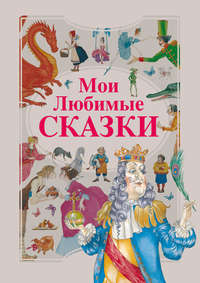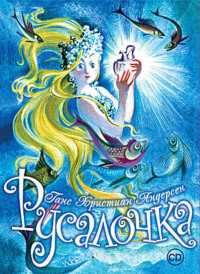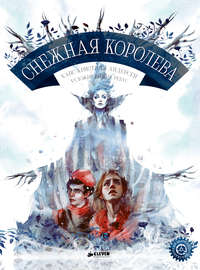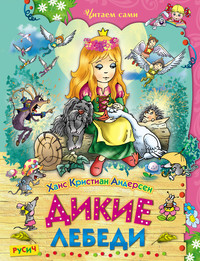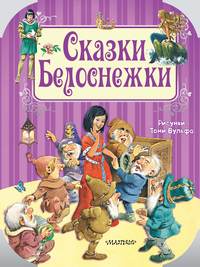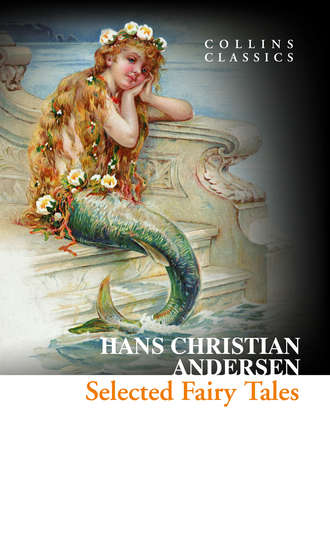
Полная версия
Selected Fairy Tales
The swallows knew nothing, but the stork, after a little reflection, nodded his head, and said, “Yes, I think I do. I met several new ships when I flew from Egypt, and they had fine masts that smelt like fir. I think these must have been the trees; I assure you they were stately, very stately.”
“Oh, how I wish I were tall enough to go on the sea,” said the fir-tree. “What is the sea, and what does it look like?”
“It would take too much time to explain,” said the stork, flying quickly away.
“Rejoice in thy youth,” said the sunbeam; “rejoice in thy fresh growth, and the young life that is in thee.”
And the wind kissed the tree, and the dew watered it with tears; but the fir-tree regarded them not.
Christmas-time drew near, and many young trees were cut down, some even smaller and younger than the fir-tree who enjoyed neither rest nor peace with longing to leave its forest home. These young trees, which were chosen for their beauty, kept their branches, and were also laid on wagons and drawn by horses out of the forest.
“Where are they going?” asked the fir-tree. “They are not taller than I am: indeed, one is much less; and why are the branches not cut off? Where are they going?”
“We know, we know,” sang the sparrows; “we have looked in at the windows of the houses in the town, and we know what is done with them. They are dressed up in the most splendid manner. We have seen them standing in the middle of a warm room, and adorned with all sorts of beautiful things,—honey cakes, gilded apples, playthings, and many hundreds of wax tapers.”
“And then,” asked the fir-tree, trembling through all its branches, “and then what happens?”
“We did not see any more,” said the sparrows; “but this was enough for us.”
“I wonder whether anything so brilliant will ever happen to me,” thought the fir-tree. “It would be much better than crossing the sea. I long for it almost with pain. Oh! when will Christmas be here? I am now as tall and well grown as those which were taken away last year. Oh! that I were now laid on the wagon, or standing in the warm room, with all that brightness and splendor around me! Something better and more beautiful is to come after, or the trees would not be so decked out. Yes, what follows will be grander and more splendid. What can it be? I am weary with longing. I scarcely know how I feel.”
“Rejoice with us,” said the air and the sunlight. “Enjoy thine own bright life in the fresh air.”
But the tree would not rejoice, though it grew taller every day; and, winter and summer, its dark-green foliage might be seen in the forest, while passers by would say, “What a beautiful tree!”
A short time before Christmas, the discontented fir-tree was the first to fall. As the axe cut through the stem, and divided the pith, the tree fell with a groan to the earth, conscious of pain and faintness, and forgetting all its anticipations of happiness, in sorrow at leaving its home in the forest. It knew that it should never again see its dear old companions, the trees, nor the little bushes and many-coloured flowers that had grown by its side; perhaps not even the birds. Neither was the journey at all pleasant. The tree first recovered itself while being unpacked in the courtyard of a house, with several other trees; and it heard a man say, “We only want one, and this is the prettiest.”
Then came two servants in grand livery, and carried the fir-tree into a large and beautiful apartment. On the walls hung pictures, and near the great stove stood great china vases, with lions on the lids. There were rocking chairs, silken sofas, large tables, covered with pictures, books, and playthings, worth a great deal of money,—at least, the children said so. Then the fir-tree was placed in a large tub, full of sand; but green baize hung all around it, so that no one could see it was a tub, and it stood on a very handsome carpet. How the fir-tree trembled! “What was going to happen to him now?” Some young ladies came, and the servants helped them to adorn the tree. On one branch they hung little bags cut out of coloured paper, and each bag was filled with sweetmeats; from other branches hung gilded apples and walnuts, as if they had grown there; and above, and all round, were hundreds of red, blue, and white tapers, which were fastened on the branches. Dolls, exactly like real babies, were placed under the green leaves,—the tree had never seen such things before,—and at the very top was fastened a glittering star, made of tinsel. Oh, it was very beautiful!
“This evening,” they all exclaimed, “how bright it will be!” “Oh, that the evening were come,” thought the tree, “and the tapers lighted! then I shall know what else is going to happen. Will the trees of the forest come to see me? I wonder if the sparrows will peep in at the windows as they fly? shall I grow faster here, and keep on all these ornaments summer and winter?” But guessing was of very little use; it made his bark ache, and this pain is as bad for a slender fir-tree, as headache is for us. At last the tapers were lighted, and then what a glistening blaze of light the tree presented! It trembled so with joy in all its branches, that one of the candles fell among the green leaves and burnt some of them. “Help! help!” exclaimed the young ladies, but there was no danger, for they quickly extinguished the fire. After this, the tree tried not to tremble at all, though the fire frightened him; he was so anxious not to hurt any of the beautiful ornaments, even while their brilliancy dazzled him. And now the folding doors were thrown open, and a troop of children rushed in as if they intended to upset the tree; they were followed more silently by their elders. For a moment the little ones stood silent with astonishment, and then they shouted for joy, till the room rang, and they danced merrily round the tree, while one present after another was taken from it.
“What are they doing? What will happen next?” thought the fir. At last the candles burnt down to the branches and were put out. Then the children received permission to plunder the tree.
Oh, how they rushed upon it, till the branches cracked, and had it not been fastened with the glistening star to the ceiling, it must have been thrown down. The children then danced about with their pretty toys, and no one noticed the tree, except the children’s maid who came and peeped among the branches to see if an apple or a fig had been forgotten.
“A story, a story,” cried the children, pulling a little fat man towards the tree.
“Now we shall be in the green shade,” said the man, as he seated himself under it, “and the tree will have the pleasure of hearing also, but I shall only relate one story; what shall it be? Ivede-Avede, or Humpty Dumpty, who fell down stairs, but soon got up again, and at last married a princess.”
“Ivede-Avede,” cried some. “Humpty Dumpty,” cried others, and there was a fine shouting and crying out. But the fir-tree remained quite still, and thought to himself, “Shall I have anything to do with all this?” but he had already amused them as much as they wished. Then the old man told them the story of Humpty Dumpty, how he fell down stairs, and was raised up again, and married a princess. And the children clapped their hands and cried, “Tell another, tell another,” for they wanted to hear the story of “Ivede-Avede;” but they only had “Humpty Dumpty.” After this the fir-tree became quite silent and thoughtful; never had the birds in the forest told such tales as “Humpty Dumpty,” who fell down stairs, and yet married a princess.
“Ah! yes, so it happens in the world,” thought the fir-tree; he believed it all, because it was related by such a nice man. “Ah! well,” he thought, “who knows? perhaps I may fall down too, and marry a princess;” and he looked forwards joyfully to the next evening, expecting to be again decked out with lights and playthings, gold and fruit. “To-morrow I will not tremble,” thought he; “I will enjoy all my splendour, and I shall hear the story of Humpty Dumpty again, and perhaps Ivede-Avede.” And the tree remained quiet and thoughtful all night. In the morning the servants and the housemaid came in. “Now,” thought the fir, “all my splendour is going to begin again.” But they dragged him out of the room and up stairs to the garret, and threw him on the floor, in a dark corner, where no daylight shone, and there they left him. “What does this mean?” thought the tree, “what am I to do here? I can hear nothing in a place like this,” and he had time enough to think, for days and nights passed and no one came near him, and when at last somebody did come, it was only to put away large boxes in a corner. So the tree was completely hidden from sight as if it had never existed. “It is winter now,” thought the tree, “the ground is hard and covered with snow, so that people cannot plant me. I shall be sheltered here, I dare say, until spring comes. How thoughtful and kind everybody is to me! Still I wish this place were not so dark, as well as lonely, with not even a little hare to look at. How pleasant it was out in the forest while the snow lay on the ground, when the hare would run by, yes, and jump over me too, although I did not like it then. Oh! it is terrible lonely here.”
“Squeak, squeak,” said a little mouse, creeping cautiously towards the tree; then came another; and they both sniffed at the fir-tree and crept between the branches.
“Oh, it is very cold,” said the little mouse, “or else we should be so comfortable here, shouldn’t we, you old fir-tree?”
“I am not old,” said the fir-tree, “there are many who are older than I am.”
“Where do you come from? and what do you know?” asked the mice, who were full of curiosity. “Have you seen the most beautiful places in the world, and can you tell us all about them? and have you been in the storeroom, where cheeses lie on the shelf, and hams hang from the ceiling? One can run about on tallow candles there, and go in thin and come out fat.”
“I know nothing of that place,” said the fir-tree, “but I know the wood where the sun shines and the birds sing.” And then the tree told the little mice all about its youth. They had never heard such an account in their lives; and after they had listened to it attentively, they said, “What a number of things you have seen? you must have been very happy.”
“Happy!” exclaimed the fir-tree, and then as he reflected upon what he had been telling them, he said, “Ah, yes! after all those were happy days.” But when he went on and related all about Christmas-eve, and how he had been dressed up with cakes and lights, the mice said, “How happy you must have been, you old fir-tree.”
“I am not old at all,” replied the tree, “I only came from the forest this winter, I am now checked in my growth.”
“What splendid stories you can relate,” said the little mice. And the next night four other mice came with them to hear what the tree had to tell. The more he talked the more he remembered, and then he thought to himself, “Those were happy days, but they may come again. Humpty Dumpty fell down stairs, and yet he married the princess; perhaps I may marry a princess too.” And the fir-tree thought of the pretty little birch-tree that grew in the forest, which was to him a real beautiful princess.
“Who is Humpty Dumpty?” asked the little mice. And then the tree related the whole story; he could remember every single word, and the little mice were so delighted with it, that they were ready to jump to the top of the tree. The next night a great many more mice made their appearance, and on Sunday two rats came with them; but they said, it was not a pretty story at all, and the little mice were very sorry, for it made them also think less of it.
“Do you know only one story?” asked the rats.
“Only one,” replied the fir-tree; “I heard it on the happiest evening of my life; but I did not know I was so happy at the time.”
“We think it is a very miserable story,” said the rats. “Don’t you know any story about bacon, or tallow in the storeroom?”
“No,” replied the tree.
“Many thanks to you then,” replied the rats, and they marched off.
The little mice also kept away after this, and the tree sighed, and said, “It was very pleasant when the merry little mice sat round me and listened while I talked. Now that is all passed too. However, I shall consider myself happy when some one comes to take me out of this place.” But would this ever happen? Yes; one morning people came to clear out the garret, the boxes were packed away, and the tree was pulled out of the corner, and thrown roughly on the garret floor; then the servant dragged it out upon the staircase where the daylight shone. “Now life is beginning again,” said the tree, rejoicing in the sunshine and fresh air. Then it was carried down stairs and taken into the courtyard so quickly, that it forgot to think of itself, and could only look about, there was so much to be seen. The court was close to a garden, where everything looked blooming. Fresh and fragrant roses hung over the little palings. The linden-trees were in blossom; while the swallows flew here and there, crying, “Twit, twit, twit, my mate is coming,”—but it was not the fir-tree they meant. “Now I shall live,” cried the tree, joyfully spreading out its branches; but alas! they were all withered and yellow, and it lay in a corner amongst weeds and nettles. The star of gold paper still stuck in the top of the tree and glittered in the sunshine. In the same courtyard two of the merry children were playing who had danced round the tree at Christmas, and had been so happy. The youngest saw the gilded star, and ran and pulled it off the tree. “Look what is sticking to the ugly old fir-tree,” said the child, treading on the branches till they crackled under his boots. And the tree saw all the fresh bright flowers in the garden, and then looked at itself, and wished it had remained in the dark corner of the garret. It thought of its fresh youth in the forest, of the merry Christmas evening, and of the little mice who had listened to the story of “Humpty Dumpty.” “Past! past!” said the old tree; “Oh, had I but enjoyed myself while I could have done so! but now it is too late.” Then a lad came and chopped the tree into small pieces, till a large bundle lay in a heap on the ground. The pieces were placed in a fire under the copper, and they quickly blazed up brightly, while the tree sighed so deeply that each sigh was like a pistol-shot. Then the children, who were at play, came and seated themselves in front of the fire, and looked at it and cried, “Pop, pop.” But at each “pop,” which was a deep sigh, the tree was thinking of a summer day in the forest; and of Christmas evening, and of “Humpty Dumpty,” the only story it had ever heard or knew how to relate, till at last it was consumed. The boys still played in the garden, and the youngest wore the golden star on his breast, with which the tree had been adorned during the happiest evening of its existence. Now all was past; the tree’s life was past, and the story also,—for all stories must come to an end at last.
The Ice Maiden
I. Little Rudy
We will pay a visit to Switzerland, and wander through that country of mountains, whose steep and rocky sides are overgrown with forest trees. Let us climb to the dazzling snow-fields at their summits, and descend again to the green meadows beneath, through which rivers and brooks rush along as if they could not quickly enough reach the sea and vanish. Fiercely shines the sun over those deep valleys, as well as upon the heavy masses of snow which lie on the mountains.
During the year these accumulations thaw or fall in the rolling avalance, or are piled up in shining glaciers. Two of these glaciers lie in the broad, rocky cliffs, between the Schreckhorn and the Wetterhorn, near the little town of Grindelwald. They are wonderful to behold, and therefore in the summer time strangers come here from all parts of the world to see them. They cross snow-covered mountains, and travel through the deep valleys, or ascend for hours, higher and still higher, the valleys appearing to sink lower and lower as they proceed, and become as small as if seen from an air balloon. Over the lofty summits of these mountains the clouds often hang like a dark veil; while beneath in the valley, where many brown, wooden houses are scattered about, the bright rays of the sun may be shining upon a little brilliant patch of green, making it appear almost transparent. The waters foam and dash along in the valleys beneath; the streams from above trickle and murmur as they fall down the rocky mountain’s side, looking like glittering silver bands.
On both sides of the mountain-path stand these little wooden houses; and, as within, there are many children and many mouths to feed, each house has its own little potato garden. These children rush out in swarms, and surround travellers, whether on foot or in carriages. They are all clever at making a bargain. They offer for sale the sweetest little toy-houses, models of the mountain cottages in Switzerland. Whether it be rain or sunshine, these crowds of children are always to be seen with their wares.
About twenty years ago, there might be seen occasionally, standing at a short distance from the other children, a little boy, who was also anxious to sell his curious wares. He had an earnest, expressive countenance, and held the box containing his carved toys tightly with both hands, as if unwilling to part with it. His earnest look, and being also a very little boy, made him noticed by the strangers; so that he often sold the most, without knowing why. An hour’s walk further up the ascent lived his grandfather, who cut and carved the pretty little toy-houses; and in the old man’s room stood a large press, full of all sorts of carved things—nut-crackers, knives and forks, boxes with beautifully carved foliage, leaping chamois. It contained everything that could delight the eyes of a child. But the boy, who was named Rudy, looked with still greater pleasure and longing at some old fire-arms which hung upon the rafters, under the ceiling of the room. His grandfather promised him that he should have them some day, but that he must first grow big and strong, and learn how to use them. Small as he was, the goats were placed in his care, and a good goat-keeper should also be a good climber, and such Rudy was; he sometimes, indeed, climbed higher than the goats, for he was fond of seeking for birds’-nests at the top of high trees; he was bold and daring, but was seldom seen to smile, excepting when he stood by the roaring cataract, or heard the descending roll of the avalanche. He never played with the other children, and was not seen with them, unless his grandfather sent him down to sell his curious workmanship. Rudy did not much like trade; he loved to climb the mountains, or to sit by his grandfather and listen to his tales of olden times, or of the people in Meyringen, the place of his birth.
“In the early ages of the world,” said the old man, “these people could not be found in Switzerland. They are a colony from the north, where their ancestors still dwell, and are called Swedes.”
This was something for Rudy to know, but he learnt more from other sources, particularly from the domestic animals who belonged to the house. One was a large dog, called Ajola, which had belonged to his father; and the other was a tom-cat. This cat stood very high in Rudy’s favour, for he had taught him to climb.
“Come out on the roof with me,” said the cat; and Rudy quite understood him, for the language of fowls, ducks, cats, and dogs, is as easily understood by a young child as his own native tongue. But it must be at the age when grandfather’s stick becomes a neighing horse, with head, legs, and tail. Some children retain these ideas later than others, and they are considered backwards and childish for their age. People say so; but is it so?
“Come out on the roof with me, little Rudy,” was the first thing he heard the cat say, and Rudy understood him. “What people say about falling down is all nonsense,” continued the cat; “you will not fall, unless you are afraid. Come, now, set one foot here and another there, and feel your way with your fore-feet. Keep your eyes wide open, and move softly, and if you come to a hole jump over it, and cling fast as I do.” And this was just what Rudy did. He was often on the sloping roof with the cat, or on the tops of high trees. But, more frequently, higher still on the ridges of the rocks where puss never came.
“Higher, higher!” cried the trees and the bushes, “see to what height we have grown, and how fast we hold, even to the narrow edges of the rocks.”
Rudy often reached the top of the mountain before the sunrise, and there inhaled his morning draught of the fresh, invigorating mountain air,—God’s own gift, which men call the sweet fragrance of plant and herb on the mountain-side, and the mint and wild thyme in the valleys. The overhanging clouds absorb all heaviness from the air, and the winds convey them away over the pine-tree summits. The spirit of fragrance, light and fresh, remained behind, and this was Rudy’s morning draught. The sunbeams—those blessing-bringing daughters of the sun—kissed his cheeks. Vertigo might be lurking on the watch, but he dared not approach him. The swallows, who had not less than seven nests in his grandfather’s house, flew up to him and his goats, singing, “We and you, you and we.” They brought him greetings from his grandfather’s house, even from two hens, the only birds of the household; but Rudy was not intimate with them.
Although so young and such a little fellow, Rudy had travelled a great deal. He was born in the canton of Valais, and brought to his grandfather over the mountains. He had walked to Staubbach—a little town that seems to flutter in the air like a silver veil—the glittering, snow-clad mountain Jungfrau. He had also been to the great glaciers; but this is connected with a sad story, for here his mother met her death, and his grandfather used to say that all Rudy’s childish merriment was lost from that time. His mother had written in a letter, that before he was a year old he had laughed more than he cried; but after his fall into the snow-covered crevasse, his disposition had completely changed. The grandfather seldom spoke of this, but the fact was generally known. Rudy’s father had been a postilion, and the large dog which now lived in his grandfather’s cottage had always followed him on his journeys over the Simplon to the lake of Geneva. Rudy’s relations, on his father’s side, lived in the canton of Valais, in the valley of the Rhone. His uncle was a chamois hunter, and a well-known guide. Rudy was only a year old when his father died, and his mother was anxious to return with her child to her own relations, who lived in the Bernese Oberland. Her father dwelt at a few hours’ distance from Grindelwald; he was a carver in wood, and gained so much by it that he had plenty to live upon. She set out homewards in the month of June, carrying her infant in her arms, and, accompanied by two chamois hunters, crossed the Gemmi on her way to Grindelwald. They had already left more than half the journey behind them. They had crossed high ridges, and traversed snow-fields; they could even see her native valley, with its familiar wooden cottages. They had only one more glacier to climb. Some newly fallen snow concealed a cleft which, though it did not extend to the foaming waters in the depths beneath, was still much deeper than the height of a man. The young woman, with the child in her arms, slipped upon it, sank in, and disappeared. Not a shriek, not a groan was heard; nothing but the whining of a little child. More than an hour elapsed before her two companions could obtain from the nearest house ropes and poles to assist in raising them; and it was with much exertion that they at last succeeded in raising from the crevasse what appeared to be two dead bodies. Every means was used to restore them to life. With the child they were successful, but not with the mother; so the old grandfather received his daughter’s little son into his house an orphan,—a little boy who laughed more than he cried; but it seemed as if laughter had left him in the cold ice-world into which he had fallen, where, as the Swiss peasants say, the souls of the lost are confined till the judgement-day.


